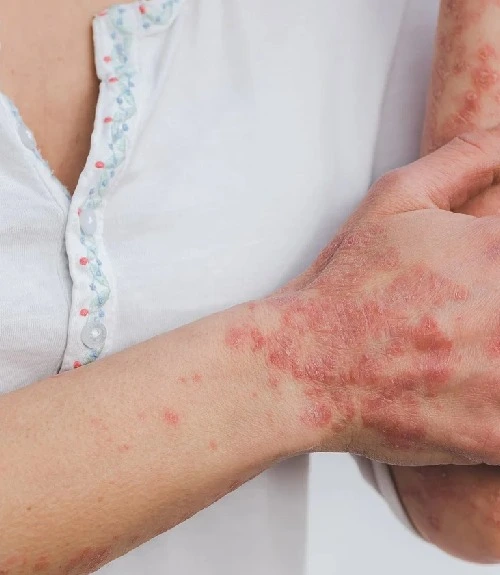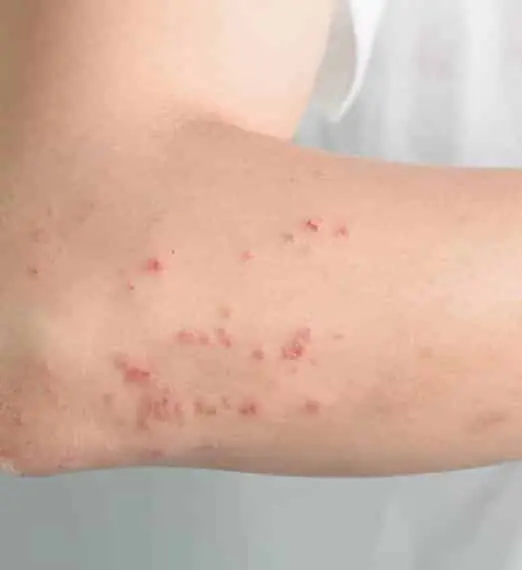Urticaria, commonly known as hives, is a skin condition characterized by the sudden appearance of raised, red, itchy welts on the skin. These welts can vary in size and may appear anywhere on the body. Urticaria can be triggered by a variety of factors, including allergies, stress, medications, and infections. In some cases, hives can appear without an identifiable cause.
While urticaria is typically harmless and resolves on its own, the condition can cause significant discomfort and, in some cases, interfere with daily activities. At Inform Clinic, we offer effective treatments to help manage the symptoms and improve your quality of life.
Urticaria can present with a variety of symptoms, including:
While urticaria is usually not dangerous, if swelling occurs around the mouth, throat, or eyes, it may indicate a more severe allergic reaction that requires immediate medical attention.
Urticaria can be caused by a wide range of factors. Some of the most common causes include:
Identifying the cause of your urticaria is an important part of the treatment process. At Inform Clinic, our experienced dermatologists will work with you to determine the trigger and recommend an effective treatment plan.
To diagnose urticaria, our dermatologists will begin with a thorough medical history and a physical examination. We will ask about:
In some cases, additional tests may be required to rule out underlying conditions or identify specific allergens. These tests may include:
Accurate diagnosis is essential to ensure you receive the most appropriate treatment and avoid further flare-ups.
Treatment for urticaria depends on the severity of symptoms and the underlying cause. At Inform, our urticaria specialists offer a range of options to help alleviate the discomfort of hives and manage outbreaks effectively.
The most common treatment for urticaria is the use of antihistamines, which help block the release of histamine—a chemical in the body that triggers allergic reactions and causes swelling. Antihistamines can help reduce itching and redness.
For more severe or chronic cases of urticaria, oral or topical corticosteroids may be prescribed to reduce inflammation and swelling.
Identifying and avoiding triggers is key in preventing further outbreaks. If you know that certain foods, medications, or environmental factors are causing your hives, we will guide you on how to minimize exposure.
For chronic or severe cases of urticaria that don’t respond to other treatments, immunosuppressants or biologic medications may be prescribed. These medications target the immune system to prevent the inflammation and symptoms of hives.
If hives are associated with a severe allergic reaction (anaphylaxis), epinephrine may be administered to treat the symptoms of swelling and difficulty breathing. In these cases, immediate medical attention is essential.
While urticaria can be a challenging condition to manage, it is treatable. Many people with urticaria experience periodic flare-ups, but with the right treatment plan, the condition can be controlled. Our urticaria specialists team at Inform is here to support you throughout your journey to manage symptoms, prevent flare-ups, and help you live comfortably.
If you experience frequent or persistent hives, or if your symptoms interfere with your daily life, don’t hesitate to schedule a consultation with our best dermatologists. We’ll work with you to create a personalized treatment plan tailored to your needs.
If you’re experiencing symptoms of urticaria or have concerns about your skin health, contact us today to schedule an appointment with one of our best dermatologist hyderabad. Book your consultation today with Dr. Keerthana Kalva,widely recognized as one of the top dermatologists in Hyderabad, renowned for her expertise in advanced skin treatments and her compassionate care. As a leading skin specialist in the city, she is dedicated to providing personalized solutions for a wide range of skin concerns, from acne and pigmentation to anti-aging and laser treatments.
Dr. Keerthana Kalva’s Inform clinic in Jubileehills is considered one of the best skin clinics in Hyderabad and Jubileehills, offering state-of-the-art facilities and cutting-edge technology to ensure the highest standard of care. Whether you're searching for the best skin specialist near you or seeking world-class dermatological services, Dr. Keerthana Kalva’s Inform Clinic is your trusted destination for flawless skin and professional excellence.
No,it is not contagious.
Urticaria looks like red,raised skin lesions, which are transient, well defined superficial erythematous swelling.
Urticaria can be caused due to drugs, infections, dust mites like inhalants, food additives and foods like fish, nut,eggs, milk,cheese.
1 Ordinary urticaria
2 Pressure urticaria
3 Aquagenic urticaria
4 Solar urticaria
5 Contact urticaria
6 Mechanical urticaria
Urticaria or hives can be manged by anti histamines, oral corticosteroids, monoclonal antibodies and immunosuppressants.
Create your perfect image!
Treat yourself with great service!
© Copyright 2019-2026, Inform Clinics | All Rights Reserved.

